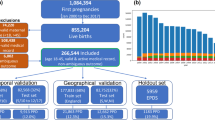Abstract
Postpartum depression is a growing public health problem amongst nursing mothers, which is not given much attention in primary health care settings. It is a type of depression experienced after childbirth that affects an estimated 13–19% of nursing mothers. Postpartum depression is very difficult to diagnose and by concentrating on somatic illnesses, most medical practitioners frequently fail to recognize it. In this paper an Adaptive Neuro Fuzzy Inference System was utilized to predict postpartum depression. Thirty-six data instances were used in training the model. The system had a training error of 7.0706e−005 at epoch 1 and an average testing error of 3.0185. This technique will facilitate the prompt and accurate diagnosis of postpartum depression.









Similar content being viewed by others
References
World Health Organisation (WHO).: Depression fact sheet (2017). http://www.who.int/mediacentre/factsheets/fs369/en/. Accessed 5 Jan 2018
American Psychiatric Association.: Diagnostic and Statistical Manual for Mental Disorders. 4th edn. (DSM-IV): American Psychiatric Association Publ., Washington, DC (2005)
DelRosario, G.A., Chang, A.C., Lee, E.D.: Postpartum depression: symptoms, diagnosis, and treatment approaches. J. Am. Acad. Physician Assist. 26, 50–54 (2013)
Wisner, K.L., Parry, B.L., Piontek, C.M.: Clinical practice: postpartum depression. N. Engl. J. Med. 347, 194–199 (2002)
O’Hara, M.W., McCabe, J.E.: Postpartum depression: current status and future directions. Ann. Rev. Clin. Psychol. 9, 379–407 (2013). https://doi.org/10.1146/annurev-clinpsy-050212-185612
Moses-Kolko, E.Erika, Kraus, R.: Antepartum and postpartum depression: healthy mom, healthy baby. J. Am. Med. Women Assoc. 59, 181–191 (2004)
Chinawa, J.M., Odetunde, O.I., Ndu, I.K., Ezugwu, E.C., Aniwada, E.C., Chinawa, A.T., Ezenyirioha, U.: Postpartum depression among mothers as seen in hospitals in Enugu, South-East Nigeria: an undocumented issue. Pan Afr. Med. J. 23, 180–186 (2016)
Pearlstein, T., Howard, M., Salisbury, A., Zlotnick, C.: Postpartum depression. Am. J. Obstet. Gynecol. 200(4), 357–364 (2009)
Carley, J.P., Dwight, M.: Breastfeeding and postpartum depression: an overview and methodological recommendations for future research. Depress. Res. Treat. (2016). https://doi.org/10.1155/2016/4765310
Soares, C.N., Zitek, B.: Reproductive hormone sensitivity and risk for depression across the female life cycle: a continuum of vulnerability? J. Psychiatry Neurosci. 33(4), 331–343 (2008)
Kent, G.N., Stuckey, B.G.A., Allen, J.R., Lambert, T., Gee, V.: Postpartum thyroid dysfunction: clinical assessment and relationship to psychiatric morbidity. Clin. Endocrinol. 51(9), 429–438 (1999)
Thurgood, S., Avery, D.M., Williamson, L.: Postpartum depression. Am. J. Clin. Med. 6, 17–22 (2009)
Earls, M.F.: Committee on psychosocial aspects of child and family health american academy of pediatrics: incorporating recognition and management of perinatal and postpartum depression into paediatric practice. Pediatrics 126(5), 1032–1039 (2010)
Marian, F.E.: Incorporating recognition and management of perinatal and postpartum depression into paediatric practice. Pediatrics 126, 1032–1039 (2010)
McLennan, J.D., Kotelchuck, M.: Parental prevention practices for young children in the context of maternal depression. Pediatrics 105(5), 1090–1095 (2000)
Odigie, B.E., Achukwu, P.U., Bello, M.E.: Neuro fuzzy implementation for cervical lesion screening in commercial sex workers. Int. J. Med. Eng. Inform. 34, 153–162 (2017)
Anish, D., Nirmal, B.H., Subhagata, C.: A neuro-fuzzy system for modeling the depression data. Int. J. Comput. Appl. 54(6), 1–6 (2012)
Sampath, R., Saradha, A.: Alzheimer’s disease classification using hybrid neuro fuzzy Runge–Kutta (HNFRK) classifier. Res. J. Appl. Sci. Eng. Technol. 10(1), 29–34 (2015)
Kavitha, M.M., Naidu, K.B.: Comparism of membership functions in adaptive network based fuzzy inference system (ANFIS) for the prediction of ground water level of a watershed. J. Comput. Appl. Res. Dev. 1(1), 35–42 (2011)
Talpur, N., Salleh, M.N.M., Hussain, K.: An investigation of membership functions on performance of ANFIS for solving classification problem. IOP Conf. Ser. Mater. Sci. Eng. 226, 012103 (2017). https://doi.org/10.1088/1757-899x/226/1/012103
Suhara, Y., Xu, Y., Pentland, A.S.: DeepMood: forecasting depressed mood based on self reported histories via recurrent neural networks. Proceedings of the 26th International Conference on World Wide Web, WWW 2017, Perth, Australia, 3–7 April 2017, pp. 715–724 (2017)
Arkaprabha, S., Ishita, B.: Artificial neural network (ANN) model to predict depression among geriatric population at a slum in Kolkata, India. J. Clin. Diagn. Res. 11(5), 01–04 (2017)
Subhrangsu, M., Kumar, A., Nirmal, B.H., Subhagata, C.: Modeling depression data: feed forward neural network vs. radial basis function neural network., Am. J. Biomed. Sci. 6(3), 166–174 (2014)
Author information
Authors and Affiliations
Corresponding author
Rights and permissions
About this article
Cite this article
Osubor, V.I., Egwali, A.O. A neuro fuzzy approach for the diagnosis of postpartum depression disorder. Iran J Comput Sci 1, 217–225 (2018). https://doi.org/10.1007/s42044-018-0021-6
Received:
Accepted:
Published:
Issue Date:
DOI: https://doi.org/10.1007/s42044-018-0021-6




